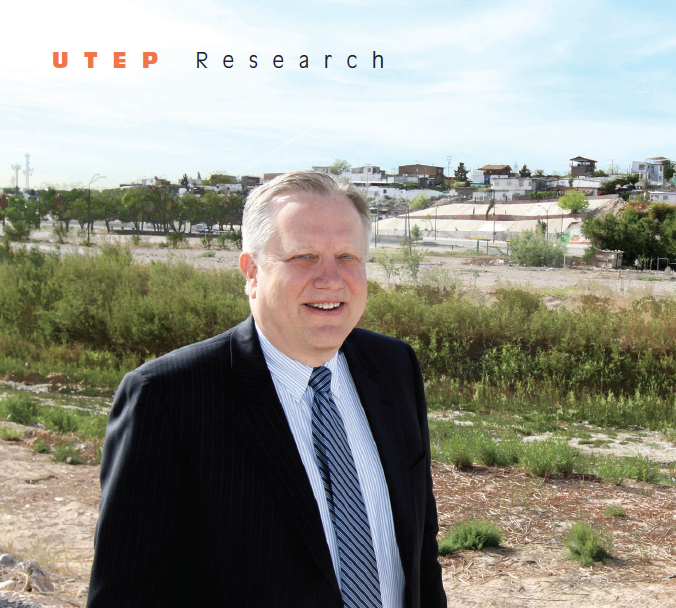Richard Posthuma did not plan on falling in love.
But he did – with his family, his career and research, and the UTEP community.
Growing up in Grand Rapids, Mich., Posthuma, J.D., Ph.D., professor of management in UTEP’s Department of Marketing and Management in the College of Business Administration, never dreamed he would be living in the arid mountain desert, investing himself in a bicultural community, but now he says he is “fully embedded” in his El Paso and UTEP families.
“When I got here in 1999, I was a single guy with a dog and a cat,” he recalled. “It’s a great place to be – I love this University, the people of El Paso and Juárez, my family, church, colleagues and of course, the students.”

He studies employee staffing, conflict management and legal institutions in the United States and international settings.
According to Posthuma, UTEP is also an amazing place to conduct research.
“Being a part of the UT System gives us a huge advantage to do high-level research with a wide variety of databases and resources to draw from,” Posthuma said.
His research has largely been compiled through international comparative studies, field research in organizations and surveys with employers and employees.
He focuses on three elements of “high performance work practices” needed to make a workplace more profitable and effective: staffing, or how a company hires, trains and deploys staff to the positions they should fill; compensation, because fair incentive compensation produces happy employees and positive results; and justice, because employees who are treated fairly are more likely to go above and beyond, and have higher morale and effectiveness.
Although all three elements are equally important, and are not the only high-performance work practices a company can implement, one of the most beneficial is justice in the workplace, according to Posthuma.
“When employees are treated fairly, several good things happen: they are less likely to quit, more likely to exceed expectations in the level and quality of their work, less likely to complain or file lawsuits against an employer, and, best of all, they are more creative and come up with new innovations. It’s a win-win,” he said.
Posthuma points out that of the three elements he studies, justice is one that costs an employer almost nothing.
“Justice is part of good leadership,” he said. “Supervisors need to be able to say ‘I’m sorry, I made a mistake, forgive me.’”
Posthuma says these high-performance practices can be applied across the board in any country, with adjustments made for cultural differences.
“People are people and want to be treated fairly and paid a fair wage. They are similar in every country, but in this research we also study the differences,” he said.
Some of those differences are profiled in the highly sought-after publication that Posthuma edits, the International Journal of Conflict Management: Conflict Management in the Middle East. The publisher, Emerald Group Publishing Ltd., reports that the journal is a hot commodity in Israel.
In his research, Posthuma applies a philosophy that springs from his years of success as an attorney and human resources professional.
“The ‘Golden Rule of Research’ is: if you’re involving human beings in your research, treat them with fairness and respect – and publish something that will actually help others,” he said.
Monica Puga, human resources manager for the El Paso Fire Department and a former graduate student of Posthuma’s, has been positively impacted by the professor and his research theories, both academically and professionally.
“Dr. Posthuma is more than an excellent teacher and researcher. He is a mentor who develops and prepares students to succeed in the real world,” Puga said. “He doesn’t abandon his students once they graduate, but has encouraged me many times to apply his human resources theories, with great success.”
The experience of being downsized does not have to be devastating, but Posthuma said employers are not always wise in carrying out what has to be done. He recalled an example of the “total opposite” of a high performance practice, when a large company decided to inform employees not to come back on Monday by sending text messages to their phones at the end of the business day on Friday.
“When negative things must happen, how you do them matters – especially to the employees,” he said.
Posthuma’s “Golden Rule” spills over into his teaching at UTEP, where he regularly integrates his research into his teaching curriculum.
Posthuma is also involved in campus life as the faculty adviser of the Baptist Student Ministry, and academic adviser for the Center for Multicultural Management and Ethics, a program in development.
“Professor Posthuma is a professor who is fully committed to his research, his students, and our college,” said College of Business Administration Dean Robert Nachtmann, D.B.A. “I cannot think of one major change in the life of our college that Professor Posthuma has not willingly and completely committed his time and his competence to make a success.”
Through the classroom and research projects, Posthuma’s guidance offers UTEP students the opportunity to break into a higher level of academics. He says that involving students in research is part of what makes UTEP a “make-a-difference school.”
“There’s a big world out there that matters to these students and to my own children as well – they are the future, and I want to give something back to them,” he said. “I want to teach them there are ethical ways to run a business or government.”